4名词性从句的翻译
名词性从句的翻译
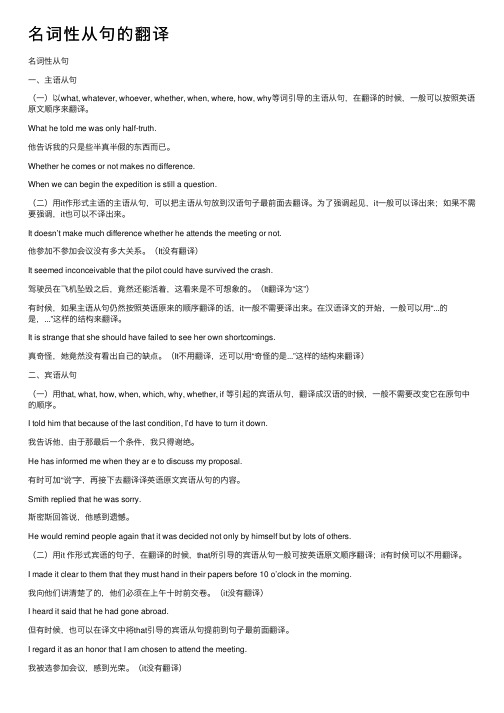
名词性从句的翻译名词性从句⼀、主语从句(⼀)以what, whatever, whoever, whether, when, where, how, why等词引导的主语从句,在翻译的时候,⼀般可以按照英语原⽂顺序来翻译。
What he told me was only half-truth.他告诉我的只是些半真半假的东西⽽已。
Whether he comes or not makes no difference.When we can begin the expedition is still a question.(⼆)⽤it作形式主语的主语从句,可以把主语从句放到汉语句⼦最前⾯去翻译。
为了强调起见,it⼀般可以译出来;如果不需要强调,it也可以不译出来。
It doesn’t make much difference whether he attends the meeting or not.他参加不参加会议没有多⼤关系。
(It没有翻译)It seemed inconceivable that the pilot could have survived the crash.驾驶员在飞机坠毁之后,竟然还能活着,这看来是不可想象的。
(It翻译为“这”)有时候,如果主语从句仍然按照英语原来的顺序翻译的话,it⼀般不需要译出来。
在汉语译⽂的开始,⼀般可以⽤“...的是,...”这样的结构来翻译。
It is strange that she should have failed to see her own shortcomings.真奇怪,她竟然没有看出⾃⼰的缺点。
(It不⽤翻译,还可以⽤“奇怪的是...”这样的结构来翻译)⼆、宾语从句(⼀)⽤that, what, how, when, which, why, whether, if 等引起的宾语从句,翻译成汉语的时候,⼀般不需要改变它在原句中的顺序。
四类名词性从句详解

四类名词性从句详解所谓名词性从句,就是指其作用相当于名词的从句,它包括主语从句、表语从句、宾语从句和同位语从句。
一、主语从句1.引导词:主语从句就是在复合句中用作主语的从句,引导主语从句的引导词主要有三类:一是that;二是whether;三是那些可以用作疑问词的词语,如what, who, which, when, where, how, why等。
如:That we shall be late is certain. 我们要晚了,这是确定无疑的。
What he says is not important. 他说的话并不重要。
How this happened is not clear to anyone. 这件事怎样发生的,谁也不清楚。
Which side wins makes no difference to him. 哪边赢他都无所谓。
Whether it will do us harm remains to be seen. 是否对我们有害还要看一看。
2.形式主语:有时为了避免句子显得“头重脚轻”,可用it作形式主语放在句首,而把真正的主语放在句末。
如:It’s a pity that he didn’t come. 很遗憾他没来。
It’s not yet known what she did. 她做什么还不得而知。
It was uncertain whether he could come or not. 他是否会来还不肯定。
这三句句首的it均为形式主语,相应的真主语分别是that he didn’t come / what she did / whether he could come or not。
二、表语从句表语从句就是在复合句中用作表语的从句。
一般说来,可用于引导主语从句的引导词也可用于引导表语从句,如that, what, who, which, when, where, how, why, whether等。
英译汉——名词性从句的译法

考研英语每日一课(英译汉——名词性从句的译法)英译汉——名词性从句的译法英语名词性从句包括主语从句,宾语从句, 表语从句和同位语从句, 在翻译这类从句时, 大多数可以按照原文的句序翻译成相应的汉语,但是也有一些具体的处理方法,下面我们结合一些实例加以说明:例1.How andwhenhuman lang uagedevel opedand w hethe r ani malssuchasch impan zeesand g orill as ca n dev elopa mor e ela borat e sys tem o f com munic ation areissue s atprese nt be ing r esear ched, butas ye t lit tle u nders tood.人类的语言是如何发展起来的, 是什么时候形成的, 诸如黑猩猩和大猩猩一类的动物是否会形成一种更加复杂的交流系统,都是现阶段人们研究的课题, 但对此人们都知之甚少。
(主语从句)例2.How w ell t he pr edict ion w ill b e val idate d bylater perf orman ce de pends upon theamoun t, re liabi lity, andappro priat eness of t he in forma tionusedand o n the skil l andwisd om wi th wh ich i t isinter prete d. (95年考题)这些预测能在多大程度上被后来的成绩所证实取决于所使用的信息的量、可靠性和适合程度,并取决于对信息作出解释的技能和智慧。
英语八大从句类型例句
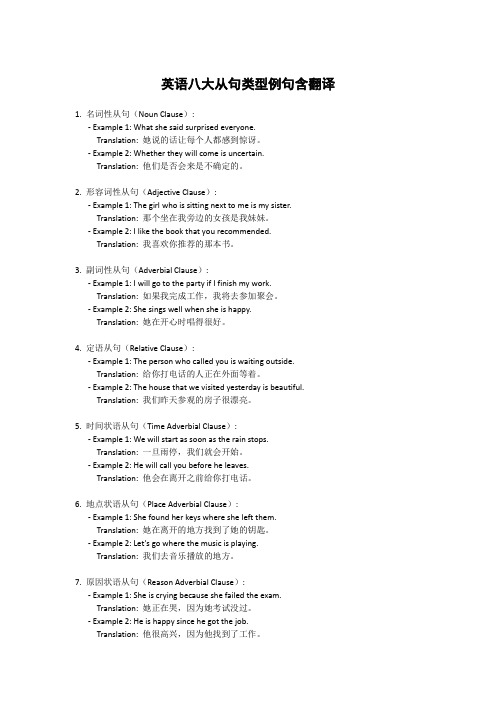
英语八大从句类型例句含翻译1. 名词性从句(Noun Clause):- Example 1: What she said surprised everyone.Translation: 她说的话让每个人都感到惊讶。
- Example 2: Whether they will come is uncertain.Translation: 他们是否会来是不确定的。
2. 形容词性从句(Adjective Clause):- Example 1: The girl who is sitting next to me is my sister.Translation: 那个坐在我旁边的女孩是我妹妹。
- Example 2: I like the book that you recommended.Translation: 我喜欢你推荐的那本书。
3. 副词性从句(Adverbial Clause):- Example 1: I will go to the party if I finish my work.Translation: 如果我完成工作,我将去参加聚会。
- Example 2: She sings well when she is happy.Translation: 她在开心时唱得很好。
4. 定语从句(Relative Clause):- Example 1: The person who called you is waiting outside.Translation: 给你打电话的人正在外面等着。
- Example 2: The house that we visited yesterday is beautiful.Translation: 我们昨天参观的房子很漂亮。
5. 时间状语从句(Time Adverbial Clause):- Example 1: We will start as soon as the rain stops.Translation: 一旦雨停,我们就会开始。
英语从句的翻译
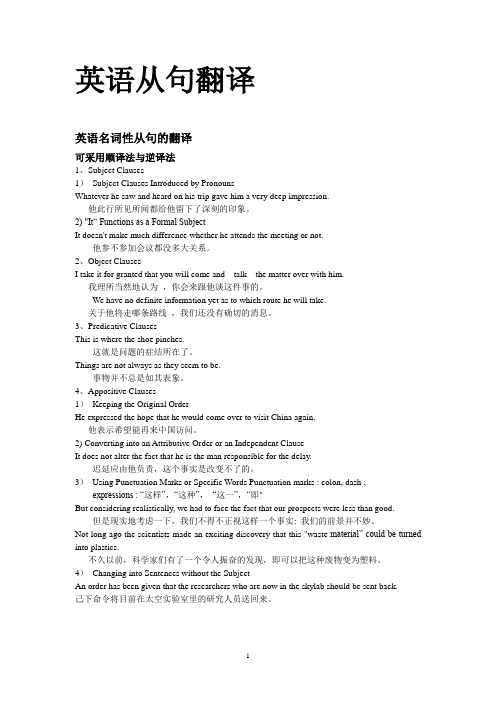
英语从句翻译英语名词性从句的翻译可采用顺译法与逆译法1、Subject Clauses1)Subject Clauses Introduced by PronounsWhatever he saw and heard on his trip gave him a very deep impression.他此行所见所闻都给他留下了深刻的印象。
2) "It“ Functions as a Formal SubjectIt doesn't make much difference whether he attends the meeting or not.他参不参加会议都没多大关系。
2、Object ClausesI take it for granted that you will come and talk the matter over with him.我理所当然地认为,你会来跟他谈这件事的。
We have no definite information yet as to which route he will take.关于他将走哪条路线,我们还没有确切的消息。
3、Predicative ClausesThis is where the shoe pinches.这就是问题的症结所在了。
Things are not always as they seem to be.事物并不总是如其表象。
4、Appositive Clauses1)Keeping the Original OrderHe expressed the hope that he would come over to visit China again.他表示希望能再来中国访问。
2) Converting into an Attributive Order or an Independent ClauseIt does not alter the fact that he is the man responsible for the delay.迟延应由他负责,这个事实是改变不了的。
名词性从句翻译
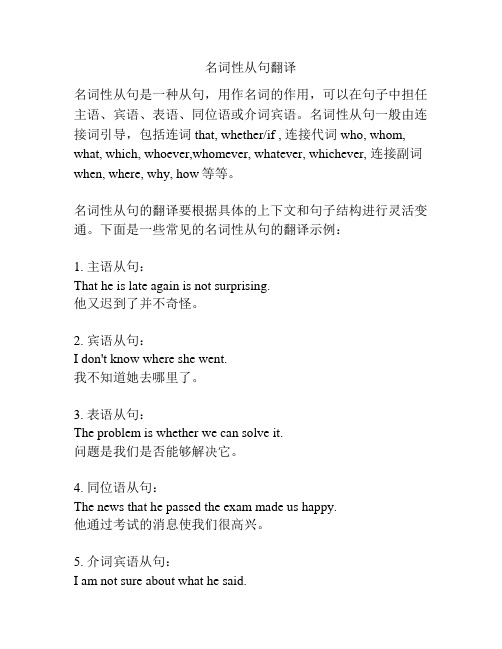
名词性从句翻译名词性从句是一种从句,用作名词的作用,可以在句子中担任主语、宾语、表语、同位语或介词宾语。
名词性从句一般由连接词引导,包括连词that, whether/if , 连接代词who, whom, what, which, whoever,whomever, whatever, whichever, 连接副词when, where, why, how等等。
名词性从句的翻译要根据具体的上下文和句子结构进行灵活变通。
下面是一些常见的名词性从句的翻译示例:1. 主语从句:That he is late again is not surprising.他又迟到了并不奇怪。
2. 宾语从句:I don't know where she went.我不知道她去哪里了。
3. 表语从句:The problem is whether we can solve it.问题是我们是否能够解决它。
4. 同位语从句:The news that he passed the exam made us happy.他通过考试的消息使我们很高兴。
5. 介词宾语从句:I am not sure about what he said.我不确定他说的是什么。
6. 间接引导名词性从句:He asked where I lived.他问我住在哪里。
7. 是否从句:I wonder whether/if she will come to the party.我想知道她是否会来参加派对。
8. 选择性从句:He asked me whether I preferred coffee or tea.他问我是喜欢咖啡还是茶。
9. 宾语从句(陈述句变为疑问句):Do you know what time it is?你知道现在几点钟吗?10. 宾语从句(连接代词):I wonder who is going to pick us up at the airport.我想知道谁会在机场接我们。
高中英语知识点归纳名词性从句
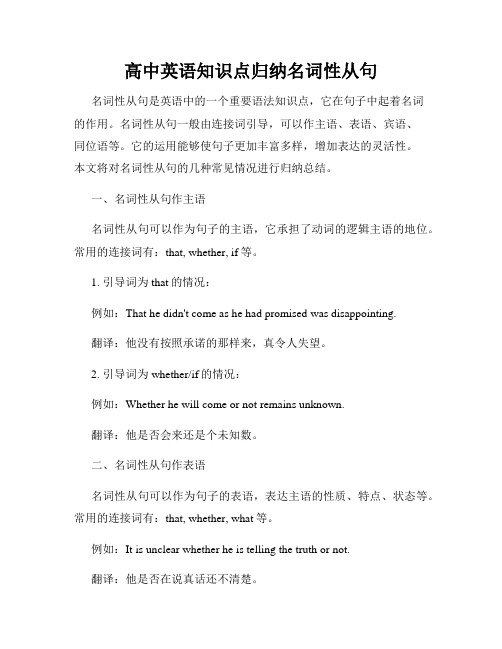
高中英语知识点归纳名词性从句名词性从句是英语中的一个重要语法知识点,它在句子中起着名词的作用。
名词性从句一般由连接词引导,可以作主语、表语、宾语、同位语等。
它的运用能够使句子更加丰富多样,增加表达的灵活性。
本文将对名词性从句的几种常见情况进行归纳总结。
一、名词性从句作主语名词性从句可以作为句子的主语,它承担了动词的逻辑主语的地位。
常用的连接词有:that, whether, if等。
1. 引导词为that的情况:例如:That he didn't come as he had promised was disappointing.翻译:他没有按照承诺的那样来,真令人失望。
2. 引导词为whether/if的情况:例如:Whether he will come or not remains unknown.翻译:他是否会来还是个未知数。
二、名词性从句作表语名词性从句可以作为句子的表语,表达主语的性质、特点、状态等。
常用的连接词有:that, whether, what等。
例如:It is unclear whether he is telling the truth or not.翻译:他是否在说真话还不清楚。
三、名词性从句作宾语名词性从句可以作为句子的宾语,接在及物动词、介词后面。
常用的连接词有:that, whether, if, what, who, whom, which, whose等。
1. 当宾语从句是及物动词的宾语时,常用连接词是that。
例如:He said that he would come tomorrow.翻译:他说他明天会来。
2. 当宾语从句是介词的宾语时,常用连接词是whether/if, 当介词为介词to时,连接词也可以用为不定式to。
例如:She is not sure about whether/if he will join us.翻译:她不确定他是否会加入我们。
什么是名词性从句
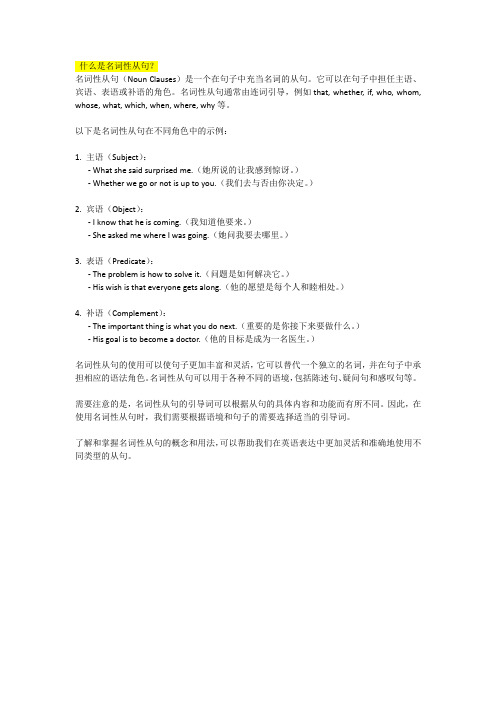
什么是名词性从句?名词性从句(Noun Clauses)是一个在句子中充当名词的从句。
它可以在句子中担任主语、宾语、表语或补语的角色。
名词性从句通常由连词引导,例如that, whether, if, who, whom, whose, what, which, when, where, why等。
以下是名词性从句在不同角色中的示例:1. 主语(Subject):- What she said surprised me.(她所说的让我感到惊讶。
)- Whether we go or not is up to you.(我们去与否由你决定。
)2. 宾语(Object):- I know that he is coming.(我知道他要来。
)- She asked me where I was going.(她问我要去哪里。
)3. 表语(Predicate):- The problem is how to solve it.(问题是如何解决它。
)- His wish is that everyone gets along.(他的愿望是每个人和睦相处。
)4. 补语(Complement):- The important thing is what you do next.(重要的是你接下来要做什么。
)- His goal is to become a doctor.(他的目标是成为一名医生。
)名词性从句的使用可以使句子更加丰富和灵活,它可以替代一个独立的名词,并在句子中承担相应的语法角色。
名词性从句可以用于各种不同的语境,包括陈述句、疑问句和感叹句等。
需要注意的是,名词性从句的引导词可以根据从句的具体内容和功能而有所不同。
因此,在使用名词性从句时,我们需要根据语境和句子的需要选择适当的引导词。
了解和掌握名词性从句的概念和用法,可以帮助我们在英语表达中更加灵活和准确地使用不同类型的从句。
- 1、下载文档前请自行甄别文档内容的完整性,平台不提供额外的编辑、内容补充、找答案等附加服务。
- 2、"仅部分预览"的文档,不可在线预览部分如存在完整性等问题,可反馈申请退款(可完整预览的文档不适用该条件!)。
- 3、如文档侵犯您的权益,请联系客服反馈,我们会尽快为您处理(人工客服工作时间:9:00-18:30)。
When we can begin the expedition is still a question.
How he is going to do it is a mystery.
(二)用it作形式主语的主语
1997-72
三、表语从句
It seems that it is going to snow. That is why Jack got scolded. The question remains whether we
can win the majority of the people. His view of the press was that the
reporters were either for him or against him.
2002-61
四、同位语从句
belief(相信),fact(事实),hope(希 望), idea(想法,观点),doubt(怀 疑),news(新闻,消息),rumor(传 闻),conclusion(结论),evidence(证 据),suggestion(建议),problem(问 题),order(命令),answer(回答), decision(决定),discovery(发现), explanation(解释),information(消 息),knowledge(知识),law(法律), opinion(意见,观点),truth(真理,事 实),promise(承诺),report(报告), thought(思想),statement(声明), rule(规定),possibility(可能)
I heard it said that he had gone abroad.
I regard it as an honor that I am chosen to attend the meeting.
We consider it absolutely necessary that we should open our door to the outside world.
It is strange that she should have failed to see her own shortcomings.
2000-72
二、宾语从句
(一)用that, what, how, when, which, why, whether, if 等引起 的宾语从句,翻译成汉语的时 候,一般不需要改变它在原句 中的顺序。
(一)一般来说,同位语从句可以 直接翻译在主句后面。
He expressed the hope that he would come over to visit China again.
There is a possibility that he is a spy.
(二)有时候在翻译同位语从句时,可 以将其放在所修饰的名词前面,相当 于前置的修饰语,但不一定使用定语 的标志词“的”。这种情况下,同位 语从句都是比较简单。
We have reached the conclusion that practice is the criterion for testing truth.
Not long ago, the scientists made an exciting discovery that this waste material could be turned into plastics.
We know the fact that bodies possess weight.
The rumor that he was arrested was unfounded.
(三)增加“即”(或者“以为”) 这样的词来连接,或用冒号、破折 号直接分开主句和同位语从句。
But this does not in any way alter the fact that they are now, from a practical point of view, irrational.
从句,可以把主语从句放到
汉语句子最前面去翻译。为 了强调起见,it一般可以译 出来;如果不需要强调,it 也可以不译出来。
It doesn’t make much difference whether he attends the meeting or not.
It seemed inconceivable that the pilot could have survived the crash.
名词性从句的翻译
一、主语从句
(一)以what, whatever, whoever, whether, when, where, how, why等词引导的 主语从句,在翻译的时候, 一般可以按照英语原文顺序 来翻译。
What he told me was only half-truth.
Whatever is worth doing should be done well.
He has informed me when they are to disc用it 作形式宾语的句子, 在翻译的时候,that所引导的宾
语从句一般可按英语原文顺序 翻译;it有时候可以不用翻译。
I made it clear to them that they must hand in their papers before 10 o’clock in the morning.
I told him that because of the last condition, I’d have to turn it down.
Can you hear what I say?
I don’t know that he swam across the river.
I don’t know how he swam across the river.
